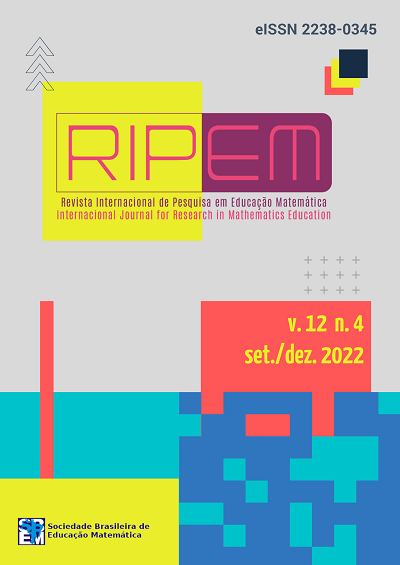Mathematical investigation in Plato’s Meno: possible interfaces among Philosophy, Mathematics and Language in studies on the Pythagorean Theorem
DOI:
https://doi.org/10.37001/ripem.v12i4.3013Keywords:
Mathematical Investigations, Pythagorean Theorem, Plato, MenoAbstract
By reading and adapting the famous passage from Plato's Meno dialogue, in which Socrates talks to a slave about some geometric properties, in the context of Basic Education, three activities are presented, according to the context of each school year, in which the benefits of inserting historical and philosophical themes are evaluated in math classes that idealize an investigative pedagogical approach. Among lamentations about schooling current conditions and the possibility of finding joy or exultation in practical activities in classroom daily life, the relevance of cultivating a genuine mathematical experience in teaching-learning processes is undeniable, especially when providing significant cognitive characteristics in articulating objects, operations and means of formalizing mathematics in several human modes of expression.
Downloads
References
Abrantes, P. (1999). Investigações em Geometria na sala de aula. In: E. Veloso, H. Fonseca, J. P. Ponte. (Org.). Ensino da geometria no virar do Milênio (pp. 153-167). Lisboa: DEFCUL.
Anthony, G. & Walshaw, M. Effective Pedagogy in Mathematics. Educational Practices Series 19. Brussels: International Academy of Education, 2009.
Babaci-Wilhite, Z. (2019). Promoting Language and STEAM as Human Rights in Education: Science, Technology, Engineering, Arts and Mathematics. Singapore: Springer Nature.
Bicudo, M. A. (2012). A pesquisa em Educação Matemática: a prevalência da abordagem qualitativa. R.B.E.C.T. 5(2), 15-27.
Braumann, C. (2002). Divagações sobre investigação matemática e o seu papel na aprendizagem da Matemática. In: J. P. Ponte; C. Costa; A. I. Rosendo; E. Maia; N. Figueiredo; & A. F. DionÃsio (Org.). Actividades de investigação na aprendizagem da Matemática e na formação de professores (pp. 5-24). Lisboa: SEM-SPCE.
Ponte, J. P. et al. (1998). O trabalho do professor numa aula de investigação matemática. Quadrante, 7(2), 41-70.
Ponte, J. P. (2014). Investigação sobre investigações Matemáticas em Portugal. Investigar em Educação, 2, 93-169.
Ponte, J. P.; Brocardo, J.; & Oliveira, H. (2003). Investigações Matemáticas na Sala de Aula. Belo Horizonte, MG: Autêntica.
D'Ambrósio, B. & Lopes, C. E. (2015). Insubordinação Criativa: um convite à reinvenção do educador matemático. Bolema, 29(51), 1-17
Garza, A. & Travis, C. (2019) The STEAM Revolution: Transdisciplinary Approaches to Science, Technology, Engineering, Arts, Humanities and Mathematics. Cham: Springer.
D’Entremont, Y. (2015). Linking Mathematics, Culture and Community. Procedia: Social and Behavioral Sciences, 174, 2818-2824.
Euclides (2009). Os Elementos. Tradução de I. Bicudo. São Paulo, SP: EdUnesp.
Fiorentini, D. (1995). Alguns modos de ver e conceber o ensino da Matemática no Brasil. Revista Zetetikê, 3(4), 1-38.
Fonseca, D. & Gualandi, J. (2020). O Laboratório de Ensino de Matemática na formação continuada de professores que ensinam Matemática. Ensino de Matemática em Debate, 7(2), 82-100.
Khine, M. & Areepattamannil, S. (2019). STEAM Education: Theory and Practice. Cham: Springer.
Lockhart, P. (2009). A Mathematician's Lament: How School Cheats us Out of Our Most Fascinating and Imaginative Art Form. New York: Bellevue Literary Press.
Pereira, R.; Palharini, B. & Damin, W. (2016) Investigações matemáticas em sala de aula: contribuições do Geogebra para a aprendizagem da função cosseno e seus parâmetros. Revista Tecnologias na Educação, 17, 1-16.
Platão (2001). Mênon. São Paulo, SP: Loyola.
Rawson, G. (2006) Platonic Recollection and Mental Pregnancy. Journal of the History of Philosophy, 44(2), 137-155.
Sandes, J. & Moreira, G. (2018). Educação Matemática e a formação de professores para uma prática docente significativa. @ambienteeducação, 11(1), 99-109.
Sartori, A. & Duarte, C. (2017). O sujeito lúdico produzido pela/na Educação Matemática: interlocuções com o neoliberalismo. Bolema, 31(57), 53-69.
Sartori, A. & Duarte, C. (2021). Repetir, memorizar, recitar: mecanismos para a fabricação de corpos dóceis pela Educação Matemática. Jornal Internacional de Estudos em Educação Matemática, 14(1), 84-91.
Stehling, D. & Conti, K. (2020) Formação continuada de professores, desenvolvimento profissional e conhecimento matemático na Educação Infantil. Educação Matemática Debate, 4(10), 1-27.
Tall, D. (1991). The Psychology of Advanced Mathematical Thinking. In: D. Tall (Org.). Advanced Mathematical Thinking (pp. 3-23). New York: Kluwer Academic Publishers.
Tall, D. (2013). How Humans Learn to Think Mathematically: exploring the three worlds of Mathematics. New York: Cambridge University Press.
Vlastos, G. (1965). Anamnesis in the Meno. Dialogue: Canadian Philosophical Review, 4(2), 143-167.
Wichnoski, P. & Klüber, T. (2018). Investigações matemáticas na Educação Matemática: uma experiência na formação inicial de professores. Revista de Educação Matemática, 15(18), 69-84.
Published
How to Cite
Issue
Section

This work is licensed under a Creative Commons Attribution-NonCommercial-ShareAlike 4.0 International License.








